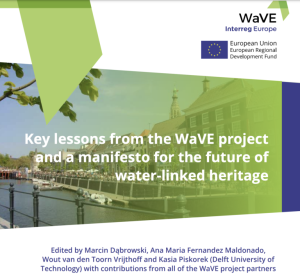We published a snappy and inspiring, policy-oriented document summarising the key take-away messages and lessons from the Interreg WaVE project, piloting actions for the use of water-linked heritage in cities and regions as a driver for ecoystemic changes and sustainability transitions. The project puts a strong emphasis on citizen engagement and co-creation as means to valorise heritage, while tackling climate change, and so does the manifesto included in this document.
Here is a summary of the document:
“Water and its related heritage play a very special role in cities and regions in Europe. Historic water infrastructures such as bridges, quays and riverfronts, port facilities, sluices, dams, or water mills, specific water-based urban and rural landscapes, but also intangible aspects of water-linked heritage, such as water management knowledge, and values and traditions, can provide a sturdy foundation for an ecosystemic approach to sustainable urban and regional development. Water-linked heritage is unique in this respect because it connects the environmental, economic and social domains, reflecting the three pillars of sustainability. By valorising water-linked heritage as a vector of ecosystemic transformation of cities and regions, we can tap into its often overlooked potential to engage diverse stakeholders, to strategically link places connected by water, and to cut across disciplines, administrative and sectoral boundaries. In other words, water and heritage connected to it can be a powerful vector of change in cities and regions that allows for building on the past practices and facilities to face the challenges of tomorrow.
In this document we depart from the experience of the WaVE project and its five locations – Breda, Alicante, Aarhus, Ravenna and the Ister-Granum Euroregion – to draw lessons on the potential of water-linked heritage to drive ecosystemic urban and regional transformations and to sketch a manifesto for the future of this heritage. The first section introduces the WaVE project and the future challenges for water-linked heritage. The second one overviews the main actions taken by the project partners and the lessons that were drawn from the interregional learning process facilitated by WaVE. Finally, the third section presents a manifesto for the future of water-linked heritage, providing policymakers and stakeholders with inspiration and guidelines for tapping into the potential of water and heritage to nudge our cities and regions to drive ecosystemic change that our cities and regions need.”
Dąbrowski, M., Fernandez Maldonado, A. M., van den Toorn Vrijthoff, W., Piskorek, K. (2022) Key lessons from the WaVE project and a manifesto for the future of water-linked heritage. Breda: Interreg WaVE.
